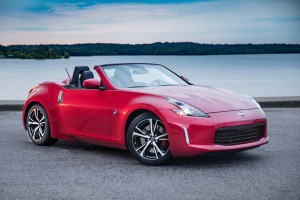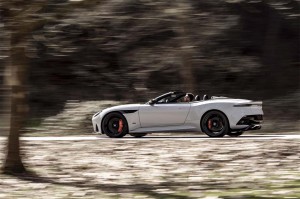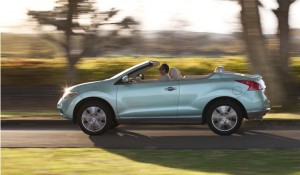
Nissan will still offer the Z Roadster overseas, but it's dropping the ragtop in the U.S. due to slow sales.
Nissan is pulling the plug on its 370Z Roadster at the end of the 2019 model-year, the Japanese automaker has confirmed, marking the end of one of the brand’s most iconic offerings.
The good news for roadster fans is that the coupe version of the sports car will remain in production indefinitely – which doesn’t mean it will last forever, just that there are no current plans to once again remove it from the line-up.
The 370Z Roadster joined the Z Coupe after it was returned to the Nissan family in 2009, part of the automaker’s turnaround program. Its demise comes as automakers rethink their passenger car strategies and, in particular, cull their slow-selling convertible offerings.
While the 370Z Roadster will remain on sale in a number of other global markets, its U.S. demise is likely no surprise considering overall Z-car sales totaled just 3,468 last year, a 33.6% decline, and the convertible made up only a small fraction of that total.
Unless the automaker gives the Roadster a reprieve or comes up with another drop-top option, its departure will leave Nissan with not a single convertible in its U.S. line-up, an absence that includes the high-line Infiniti brand which abandoned its one model shortly after redesigning and renaming the old G37 the Q50. The Nissan brand’s only other recent ragtop was a short-lived take on its midsize SUV, the Murano CrossCabriolet.
There was a time when automakers offered ragtop versions of virtually every passenger car. By the 1980s, however, ragtops had all but disappeared. They fell victim to rising costs, revised government mandates, the fact that air conditioning had become nearly ubiquitous, and the reality that American motorists were spending more and more of their time on highways, where there’s less pleasure in driving al fresco.
What was then Chrysler Corp. brought back the ragtop three decades ago in the form of the LeBaron Convertible. But while a number of manufacturers quickly followed, the range of offerings hasn’t since come close to what was available in that golden era. And, with more and more Americans migrating from passenger cars, in general, to light truck, the case for convertibles is becoming ever harder to pencil in.
A number of other ragtops have or will be departing from the marketplace, starting at the low end with the Smart fortwo – in this case, parent Daimler planning to pull the Smart brand out of the U.S. entirely. Among the more endangered models, the Buick Cascada is becoming increasingly hard for the brand to justify, sales falling by roughly a third last year. As with Smart, few would be surprised to see the Fiat 500 Convertible – as well as the hardtop model itself – go away in the next year or two.
Meanwhile, plans for a variety of ragtops have been pulled from production plans. Cadillac had been working up an option but, as it shifts focus to crossovers, convertibles and coupes are now off the table.
Unlike the 1980s, however, few expect convertibles to vanish entirely. They are an established part of the luxury market and there have actually been some new ones announced recently, including the Aston Martin DBS Superleggara Volante and the Lexus LC Convertible. Mercedes-Benz offers a number of drop-tops, and BMW is back with both an 8-Series convertible and a new version of the Z4.

Ragtops remain a popular luxury choice with new models like the Aston Martin DBS Superleggara Volante.
But that roadster actually underscores the challenges manufacturers face coming up with a justifiable business case. The Bavarian marque was only able to pull together plans for the new Z4 by partnering with Toyota – which, notably, will not offer a ragtop variant of its new Supra, the model sharing the Z4’s platform. Mazda had to follow the same route to bring the latest MX-5 Miata to market, sharing its underpinnings with the Fiat 124 Spider.
While BMW saved the Z4 and added the 8-Series cabrio, it is widely expected to drop the soft-top version of the 2-Series.
(Click Here to check out the Aston Martin DBS Superleggara Volante.)
Though the shift from cars to light trucks is carrying much of the blame for the latest ragtop reduction, automakers have been toying with ways to let motorists roll back the roofs on their SUVs and pickups, as well.
The idea has had some dark moments, notably with the Murano convertible and the retractable hardtop Chevrolet SSR pickup. But automakers continue to experiment. Land Rover added a convertible version of its first-generation Range Rover Evoque – though it has not said anything about a ragtop version of the newly introduced, second-gen SUV.
Perhaps the best-known, and the most popular, open-air utility vehicle is the Jeep Wrangler, which offers a variety of different roof options, including a canvas top and a removable hardtop. Buyers will have a similar choice with the new Jeep Gladiator pickup.
(Click Here for our review of the new Jeep Gladiator.)
But while convertibles will continue to be available in high-line – and, especially, in exotic – market niches, as well as a handful of other specialty segments, the range of choices for mainstream buyers is growing slimmer and slimmer all the time.
If you want to grab a 2019 Nissan 370Z Roadster before it vanishes, expect to spend at least $42,815 – a nearly $12,000 premium over the base Z Coupe.

